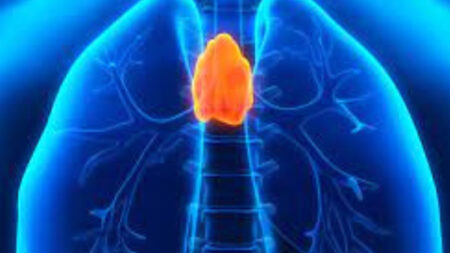The New England Journal of Medicine recently published a study on the impact of the thymus gland on human health.
What is the Thymus?
The thymus is a pyramid-shaped lymphoid organ located beneath the breastbone, near the heart in the human body. Its name is derived from the gland’s resemblance to a thyme leaf. The main role of the thymus is to support the maturation of thymus-derived cells, also known as T cells. These T cells play a crucial role in determining the specificity of the immune response against antigens, that is, foreign substances in the body. The thymus exhibits unique growth patterns. It grows rapidly and achieves its largest relative size during fetal life and in the early years after birth. As an individual reaches puberty, the thymus slowly begins to shrink, and this gradual reduction in size continues throughout their life. Despite this decrease in size, the thymus remains vital for maintaining a functional immune system throughout an individual’s adult life.

About the Study:
The New England Journal of Medicine published a study on the health consequences of thymus removal in adult humans. Conducted by researchers Kameron A. Kooshesh, Brody H. Foy, David B. Sykes, Karin Gustafsso and David T. Scadden, this study aimed to investigate the role of the thymus gland in adult humans and its potential impact on immune competence and overall health. The researchers compared the outcomes of adult patients who had undergone thymectomy (removal of the thymus) with that of a control group of patients who had undergone similar kinds of cardiothoracic surgery without having a thymectomy.
The study included one thousand four hundred and twenty patients who had undergone thymectomy and six thousand and twenty one matched in the control group. Post follow-up after five years , the group that underwent the thymectomy showed a higher rate of all-cause mortality (8.1% vs. 2.8%) and an increased vulnerability to cancer (7.4% vs. 3.7%) compared to that of the control group. The relative risk for mortality was 2.9 and for cancer, it was 2.0.
Although the risk of autoimmune disease did not differ in a very significant way between the overall primary cohort, it was notable when patients with preoperative infection, cancer, or autoimmune disease were excluded from the analysis.

In a more extended analysis of all patients with over five years of follow-up, regardless of matched controls, all-cause mortality in the group with thymectomy patients was significantly higher than that of the general population of the United States (9.0% vs. 5.2%), and cancer-specific mortality was also elevated (2.3% vs. 1.5%), revealed the study.
To understand the potential mechanisms, the researchers measured T-cell production and plasma cytokine levels in a subgroup of patients. They found that those who had undergone thymectomy had less new production of CD4+ and CD8+ lymphocytes compared to the control group. In addition to that, the group that had the thymectomy showed higher levels of proinflammatory cytokines in their blood.
Based on the researchers’ findings, the study concludes that thymectomy is associated with increased all-cause mortality, an elevated risk of cancer, and a possibility of higher risk of autoimmune disease. This suggests that the adult thymus may play a crucial role in the maintenance of immune function and overall health in the adult human body.
The study was supported by the Tracey and Craig A. Huff Harvard Stem Cell Institute Research Support Fund and other funding sources. However, further research is needed to fully understand the implications of thymectomy and the precise functions of the adult thymus in the immune system and human health.













